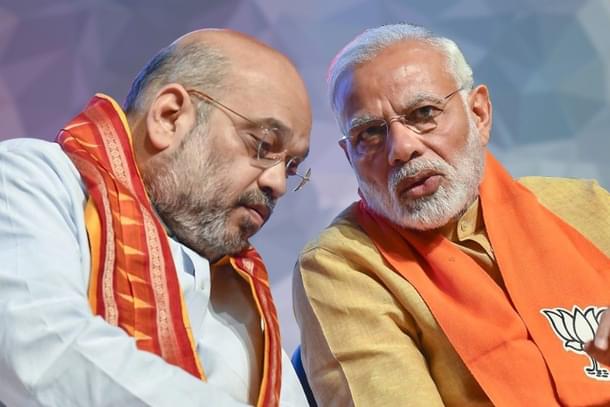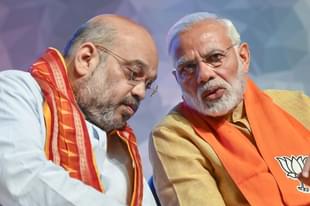Politics
After Drubbing, Modi And Shah Need To Rework Plan 2019. And, Yes, Humility Would Help
R Jagannathan
Dec 11, 2018, 05:54 PM | Updated 05:53 PM IST
Save & read from anywhere!
Bookmark stories for easy access on any device or the Swarajya app.


After the 3-0 defeat in three Hindi-belt states, including a drubbing in Chhattisgarh, it is clear that the Narendra Modi-Amit Shah battle plan for 2019 will need a major overhaul. Normally, one can say that people vote differently in assembly and Lok Sabha elections, but the scale of the Bharatiya Janata Party’s (BJP’s) losses indicate a desire for change that one cannot lose sight of. If anything, unless the BJP radically rethinks its message to the voter, which was not much in evidence in the assembly elections, even the Narendra Modi factor will not rescue it from a serious diminution in 2019.
The fact that the BJP made a fight of it in Rajasthan and Madhya Pradesh should tell us two things: one, that the BJP has lost less where it had strong local leadership. The severe loss in Chhattisgarh shows that when there is voter fatigue, even a charismatic leader cannot bring home the bacon. Raman Singh was thought to be the beneficiary of the Mayawati-Ajit Jogi third front, but the voter saw them as spoilers, and swung decisively in the other direction.
But the larger lesson for the BJP to learn is a simple one: to win an election, you need to have a credible story to tell the voter. You can have the strongest organisation on the ground, you can have all the resources needed to win elections, you can have panna-pramukhs and booth managers who can bring out the vote, but you need to have a narrative that wins, and a reason to come out and vote. This is what the BJP lacked in Chhattisgarh, though it had half a narrative in the other two states. The Congress’ counter-narrative was simple: the need for change. It worked brilliantly in one state, and well enough to dethrone the BJP in two others.
The other two landslides – in Telangana for the Telangana Rashtra Samithi (TRS), and in Mizoram for the Mizo National Front (MNF) – went against the Congress, but here too the BJP has lessons to learn. In Telangana, the Congress maintained its base, even while its partner, the Telugu Desam Party (TDP), was trounced. The BJP was nearly wiped out in the TRS tsunami, suggesting that it needs much strengthening in this state. In Mizoram, the MNF win ensures a Congress-mukt north-east, but that was already in the works. It won’t make much of a difference in 2019.
Modi and Shah have their work cut out, especially in crafting a fresh story for 2019 that goes beyond just projecting Modi’s charisma and his good intentions (saaf niyat).
While the opposition has its own challenges in producing a common candidate against the BJP in as many states as possible, Shah has to win friends and influence people – both inside the sangh parivar, and outside.
As things stand, it is clear that Modi and Shah have run a tight ship controlled totally from the top. Most intermediate leaders and partymen were ignored in most cases. As for allies, past, present and future, it needs to present a humbler hand of partnership. If not, it is going to lose the Shiv Sena just as it lost the TDP, though from a purely electoral angle, the exit of Chandrababu Naidu from the NDA, and his erasure in Telangana, is a blessing in disguise for the BJP. He is most likely to lose the next election to YSR Congress in his base of Andhra Pradesh, which gives the BJP another post-election ally to choose from if it falls short of 272.
But the more recent loss of the Kushwaha party, the Rashtriya Lok Samata Party in Bihar, will also be worrisome. It means the BJP, JDU and LPJ – assuming they stay together – will have to win against an RJD-Congress-RSLP front the next time. The game has just tilted marginally against the NDA.
The BJP is also making a mistake in believing that aggressive talk about the mandir will win it votes in Uttar Pradesh. Or anywhere else for that matter. The BJP has done practically nothing to promote a Hindu agenda so far, and its foot-soldiers from the sangh are not particularly pleased about being ignored for most of the past four-and-a-half years and now being called to put their shoulders to the wheel. There is a lot of ruffled feathers to be smoothened.
A lesson to learn about the use of Yogi Adityanath is this: he works wonders with the cadre, but his rhetoric is sometimes putting off voters too. In a hyper media age, where anything you say anywhere gets debated all over, you cannot anymore narrowcast your message to the party faithful and the general electorate. This means the BJP needs to rethink how to use Adityanath to boost its prospects.
Another mistake the BJP is making is to give Rahul Gandhi too much importance by pretending he is not important. He is now more than just the Pappu of yesteryear, and while he is bluffing most of the time, he is becoming more confident by the day. And he has good data and support staff in the party to help him draw up the right kind of strategy in each state. Rahul Gandhi’s strength is not his own big ideas, but his ability to get the party to work to a plan in many states. He seems to value listening to his supporters more than the Modi-Shah duo, and that is a huge plus in his favour.
In Telangana, the TRS won because it had a simple story to tell: we brought you your own state, now don’t bring in guys who objected to it. This is one reason why the Telugu Desam was nearly wiped out in Telangana, and additionally hampered the growth of the Congress. The smoke signals for Chandrababu Naidu in Andhra Pradesh are clear: he could lose. If the Congress were truly looking to pick a winning partner, it should be switching to YSR Congress now when there is still time.
The big lesson for the BJP from this mini general election is this: get the messaging right, keep it positive, and bring humility in your postures to friends. Arrogance does not ultimately pay.
Jagannathan is former Editorial Director, Swarajya. He tweets at @TheJaggi.





